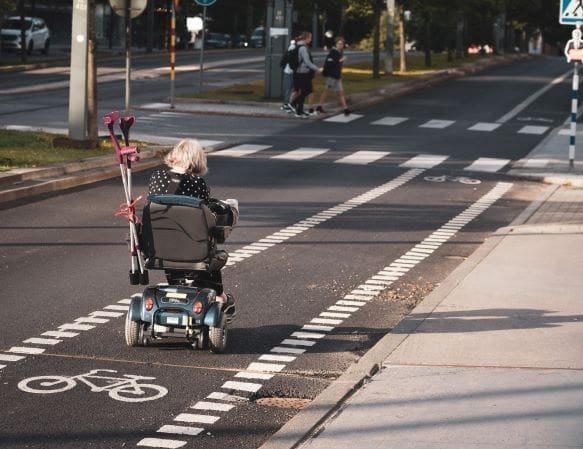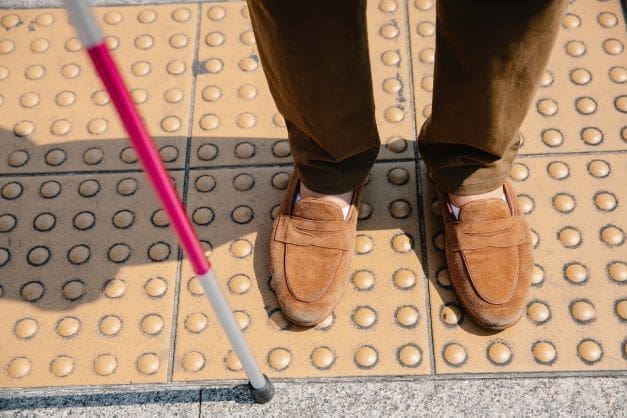FAQ regarding the Legal Rights of People with Disabilities in Israel
The following article addresses some of the most frequently asked questions regarding the rights of people with disabilities in Israel. It offers concise and illuminating answers from the perspective of an Israeli lawyer experienced in liaising between private individuals and the authorities in Israel. If you have additional questions or if you need legal assistance related to medical disabilities in Israel or any other issue, feel free to contact our law office: 03-3724722.

What are my rights as a person with disabilities in Israel?
- As a person with disabilities in Israel, you have the right to equal opportunity. It is illegal for employers, service providers, educational institutions, or anyone else, to discriminate against you.
- Additionally, you have the right to accessibility. You should have the same degree of access as anyone else to sites and services that are available to the general public.
- You also have the right to privacy. Therefore it is illegal for anyone to pressure you to disclose whether you are disabled or to invasively ask about your disability.
- And you have the right to social-economic security. Therefore, depending on the severity of your disability, you may be entitled to stipends, exemptions, and services from governmental agencies.
Israeli law defines a person with disabilities as an individual who has been diagnosed with a physical, cognitive, or mental impairment that has a major impact on their daily life. To learn more about your rights as a person with disabilities in Israel please see our article Disability Rights in Israel – a Summary.
Why should I seek to be legally recognized as disabled?
If you have a disability that affects your life in a major way, there are many reasons to have your disability officially recognized in Israel. Does your disability make it significantly more difficult for you to participate fully in the workforce? If so, then you may be eligible for a monthly disability pension and a certificate of disability from the National Insurance Institute (Bituach Leumi). The certificate of disability will grant you discounts at many sites as well as exemptions from certain taxes. You may even be eligible for an exemption from waiting in line or from paying entrance fees for a caretaker. Additionally, you may be able to receive an accessible parking permit which will increase your access to many different locations.
To learn more about why you should consider being legally recognized as a person with disabilities in Israel, please read our article Reasons to Register for Disabled Benefits.

How do I apply for a disability pension?
In order to apply for a monthly pension for persons with disabilities in Israel, first prepare for your submission by listing all your physical, cognitive, and psychological disabilities. Make sure you have a recent diagnosis or medical test for each of those conditions. Next, submit your disability claim to the National Insurance Institute (Bituach Leumi). This is most easily done through an online form. A medical committee will determine your medical disability rate and Bituach Leumi will then determine your degree of incapacity accordingly. Your degree of incapacity is a measurement of how much your ability to earn a living is reduced due to your disabilities and therefore whether or not you are eligible for financial assistance. You will receive a letter from Bituach Leumi informing you regarding your eligibility.
For more information on the application process, please see our article: Applying for a Disability Pension in Israel.
What is the difference between the “disability rate” and the “degree of incapacity”?
The National Insurance Institute uses two terms that people sometimes mistakenly conflate. The two terms are the medical disability rate (shiur nechut refuit) and the degree of incapacity (dargat i-kosher). Both are represented as percentages and both are relevant for determining whether someone is eligible to receive a pension for persons with disabilities in Israel. However, they do not measure the same thing. The medical disability rate is calculated according to the cumulative severity of all the physical, psychological, and cognitive impairments which affect an individual. The degree of incapacity, on the other hand, measures to what degree a person faces additional challenges in the workforce due to their disabilities. It takes into account both the person’s medical disability rate and other relevant factors such as education and job experience.
For a more detailed explanation of these two measurements and how they are related to each other, please see our article Medical Disability Rate VS. Degree of Incapacity – What is the Difference.

Is a disability pension for a homemaker different from a disability pension for a working person?
In Israel, a homemaker is defined as a married woman who is not employed. The size of the basic disability pension for a working person and for a homemaker is the same but there are some differences in determining eligibility for the stipend. A homemaker’s degree of incapacity is determined differently from a working person’s because it measures their ability to perform household tasks rather than hold a job in the workforce. Additionally, unlike a working person, a homemaker does not receive a bonus to their pension if their spouse is unemployed.
To learn more about applying for a disability pension as a homemaker, please see our article Homemaker’s Disability Pension in Israel – How to Apply.
How can I get a certificate of disability?
If you are an eligible person with disabilities in Israel, then Bituach Leumi should automatically send you a certificate of disability (teudat neche), also called a disability card. You are eligible for a disability card if at least one of the following criteria applies to you:
- If you receive a disability pension from the National Insurance Institute.
- If you have a degree of incapacity of at least 60%.
- If you have a medical disability rate of at least 90%.
The card functions as legal proof of your disability and entitles you to certain benefits, discounts, and exemptions. If you have not received a certificate of disability despite being eligible for one, then please call the Bituach Leumi at *6050 and explain your situation.
For more detailed information on who is eligible for a certificate of disability and its benefits, please see our article How to Get a Disability Card in Israel.

Who is entitled to an exemption from paying entrance fees for a caretaker?
Certain people with disabilities in Israel are exempt from paying entrance fees for a caretaker accompanying them. If you qualify for this entitlement it should be clearly specified on your certificate of disability. There are three categories of disabled persons who are eligible for this entitlement:
- People with a certificate of disability that have a cognitive or mental disability
- People with disabilities or chronic illnesses who require significant care from another person in order to address their daily basic needs and therefore qualify for an attendance allowance (SHARAM).
- Elderly people who receive a long-term care stipend (gimlat siud).
For more information on this topic, please see our article Caretaker Entrance Fee Exemption in Israel.
Am I entitled to an exemption from waiting in line?
Some people with disabilities in Israel are entitled to an exemption from waiting in line, namely, people eligible for a certificate of disability who have a cognitive disability, a mental disability, or are on the autism spectrum. This right will be written on your certificate of disability if you are entitled to it, but the exact nature of your disability will not be specified. Note that also pregnant women and elderly individuals above the age of 80 are exempt from waiting in line but priority is given to the person with a disability.
For more detailed information on who is entitled to an exemption from waiting in line, and in which circumstances this exemption applies and does not apply, please see our article Waiting Exemption for People with Disabilities in Israel.

Who qualifies for an accessible parking permit?
An accessible parking permit, which is officially called a parking badge for a person with disabilities (tav chanaya laneche), is a laminated badge that is issued by the Israeli Department of Transport and which demonstrates that a vehicle is permitted to park in places allocated for disabled persons. It also allows a driver to park a vehicle in a location where parking is normally illegal, as long as they do not endanger anyone or cause unreasonable disruption to traffic. You are entitled to an accessible parking permit if you require a wheelchair for mobility or if your legs are otherwise seriously impaired, or if you have a medical disability rate of over 60% and require a vehicle for mobility, or if you are blind or visually impaired. Even if you do not fit one of the above criteria, you are still eligible for the permit if you became disabled as an IDF soldier or if you became disabled due to a terrorist attack.
For more information on a parking badge for a person with disabilities in Israel, please read our article: Applying for an Accessible Parking Permit.
How do I apply for an accessible parking permit?
If you meet the above criteria for a parking badge for a person with disabilities in Israel, then you can submit a request to the Department of Transport. Make sure to attach proof of your disability, a copy of your National ID Card, a letter specifying which vehicles require the permit (up to two), and copies of the vehicles’ registration papers.
For more information on the application process, please read our article: Applying for an Accessible Parking Permit.
Who is entitled to a certificate of blindness?
Israel follows international standards in the definition of a person as legally blind. A blind person is defined as anyone who either has no ability to see whatsoever, or whose vision in their strongest eye is 3/60 or less even with glasses, or whose field of vision in their strongest eye is 20 degrees or less. An Israeli resident who is legally blind will be issued a certificate of blindness/visual impairment (teudat iver/lakui re’iya) by the Ministry of Welfare and Social Services. Depending on the visually impaired person’s specific medical condition they will either receive a permanent certificate or a temporary certificate of blindness.
For more information on the rights of people with visual disabilities in Israel, please see our article A Blind Person’s Rights in Israel.

What are the benefits of having a certificate of blindness?
A certificate of blindness allows access to various rehabilitation services, discounts, and exemptions (e.g. free public transportation and an exemption from paying income tax). Moreover, any legally blind person should also be issued a certificate of disability since their medical disability rate would be at least 90%. For the same reason, a blind person would normally qualify for a general disability pension except for cases in which the person has a high income. Additionally, anyone who is completely blind, has a permanent certificate of blindness, and lives in their own household can apply for a monthly stipend for the blind/visually impaired on top of the general disability pension. The purpose of this additional stipend is to help pay for assistance and guiding services from a sighted person.
Moreover, an Israeli resident with a certificate of blindness who would like to have a guide dog is entitled to receive one free of charge, if they would benefit from a guide dog and are capable of taking care of one. The necessary training to work properly with the dog is also provided for free. Additionally, the blind person will receive a special monthly stipend that should cover all the upkeep expenses for the guide dog.
For more information on entitlements for people with visual disabilities in Israel, please see our article A Blind Person’s Rights in Israel.
Can I be refused entry to a site because I use a guide dog for the visually impaired?
A blind person has the right to enter with their guide dog into any site or public transportation vehicle that serves the general public. Moreover, no one is allowed to charge a fee for the entrance of the guide dog. Privately owned sites are not exempt from this law. Anyone who does not allow a blind person to enter a site with their guide dog is subject to fines as high as 10,000 NIS. Likewise, employers must accommodate the guide dog of a blind employee in the workplace. Likewise, it is illegal for a potential employer to discriminate against a qualified candidate for a job because of their use of a guide dog.
To learn more about the rights of people with visual disabilities in Israel, please see our article, A Blind Person’s Rights in Israel.
Who can I contact for help on disability rights?
There exist in Israel organizations that attempt to provide free bureaucratic assistance to people with disabilities. However, if you would like to hire an experienced lawyer for legal advice on disability rights or for the purpose of litigation, then consider contacting our law offices. Our attorneys have a great deal of experience in liaising between private citizens and the authorities in Israel.
If this article leaves you with more questions regarding the rights of people with disabilities in Israel, please contact us and we will be glad to assist you.
מאמרים מומלצים

